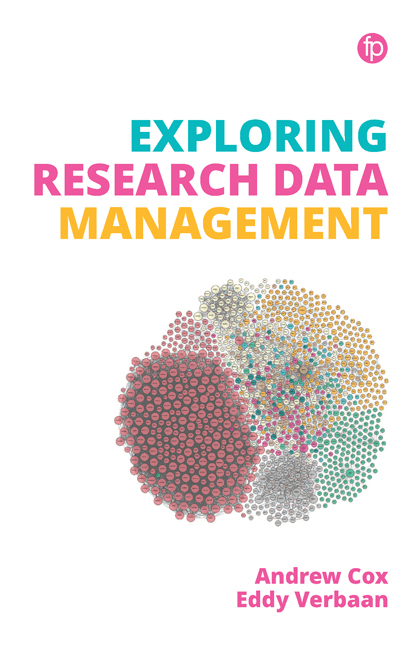Book contents
- Frontmatter
- Contents
- List of tables and figures
- 1 Introducing Research Data Management
- 2 The Social Worlds of Research
- 3 What Are Research Data?
- 4 Case Study of RDM in an Environmental Engineering Science Project
- 5 RDM: Drivers and Barriers
- 6 RDM as a Wicked Challenge
- 7 Research Data Services
- 8 Staffing a Research Data Service
- 9 Requirements Gathering for a Research Data Service
- 10 Institutional Policy and the Business Case for Research Data Services
- 11 Support and Advice for RDM
- 12 Practical Data Management
- 13 Data Management Planning
- 14 Advocacy for Data Management and Sharing
- 15 Training Researchers and Data Literacy
- 16 Infrastructure for Research Data Storage and Preservation
- 17 Evaluation of RDS
- 18 Ethics and Research Data Services
- 19 A Day in the Life Working in an RDS
- 20 Conclusion: the Skills and Mindset to Succeed in RDM
- Index
11 - Support and Advice for RDM
Published online by Cambridge University Press: 21 September 2019
- Frontmatter
- Contents
- List of tables and figures
- 1 Introducing Research Data Management
- 2 The Social Worlds of Research
- 3 What Are Research Data?
- 4 Case Study of RDM in an Environmental Engineering Science Project
- 5 RDM: Drivers and Barriers
- 6 RDM as a Wicked Challenge
- 7 Research Data Services
- 8 Staffing a Research Data Service
- 9 Requirements Gathering for a Research Data Service
- 10 Institutional Policy and the Business Case for Research Data Services
- 11 Support and Advice for RDM
- 12 Practical Data Management
- 13 Data Management Planning
- 14 Advocacy for Data Management and Sharing
- 15 Training Researchers and Data Literacy
- 16 Infrastructure for Research Data Storage and Preservation
- 17 Evaluation of RDS
- 18 Ethics and Research Data Services
- 19 A Day in the Life Working in an RDS
- 20 Conclusion: the Skills and Mindset to Succeed in RDM
- Index
Summary
Aims
The aim of this chapter is to consider the requirements for an effective support and advice service for RDM, especially designing its web presence.
Offering support and advice
A core aspect of an RDS will be to provide information, support and advice to researchers in a timely and reliable manner. Providing a good support and advice service is challenging for a number of reasons:
Researchers’ issues are inevitably diverse, reflecting the wide range of research practices in different fields.
Their issues are likely to be quite technical and couched in very specific forms related to a specific research project. In offering advice RDS staff are unlikely to fully understand the research objective or the wider norms of the research culture within which the research is being conducted.
The timing of when issues are likely to be raised is unpredictable. A project idea can be developed at any time, so requests for information, while they will reflect cycles of activity for research, cannot be easily predicted. A request is quite likely to be perceived by the researcher as urgent.
Researchers will not necessarily label the issue they have as ‘research data management’, so what they ask and who they ask for help is again unpredictable. An advice service has to be both visible and able to explain clearly the scope of the RDS. Equally it's probable that the service may be asked questions somewhat beyond its remit, which it may seek to answer or refer to others. For example, researchers might well ask about relevant standards or anonymisation techniques.
Drawing the line between information and advocacy may also be problematic.
A big part of the advice service will probably be around data management planning. The topic is important enough to have a chapter of its own (Chapter 13).
As in any form of advice service, there are some general principles it makes sense to observe. For example, the American Reference and User Services Association (RUSA, 2013; 2017) identify the following five factors as key to a successful reference service:
Visibility/approachability – the service needs to be visible to its potential users and offer an approachable appearance.
Interest – in responding to initial enquiries there is a need to project a sense of interest in questions asked.
Information
- Type
- Chapter
- Information
- Exploring Research Data Management , pp. 101 - 106Publisher: FacetPrint publication year: 2018
